
Page 13 — English
OPERATION
For workpieces longer than 48 in., greater care must be
taken to reduce the problem because the additional length
means more of the total weight is unsupported by the planer
table and rollers, causing the shifting weight to work against
keeping the stock flat.
To remove snipe from a finished workpiece, cut off the end
of the workpiece where snipe is noticeable.
WARPED WOOD
Little or no warpage is the ideal condition for planing a
workpiece. Simply turn the workpiece over and plane it to
the desired thickness. Otherwise, plane the top first, turn
the workpiece and plane the bottom.
For a board that is cupped or bowed across its width, the
best method is to rip the board lengthwise down the middle
and plane the pieces separately. This method eliminates
much of the waste in planing cupped or bowed workpieces.
The only way to remove the bow from a workpiece that is
cupped or bowed down its length is to use a jointer.
Avoid using severely warped wood as it can jam the planer.
If it must be used, rip it in half before planing to help mini-
mize the possibility of jamming. If jamming does occur, turn
the switch off and unplug the planer immediately. Raise the
cutter head assembly high enough to remove the workpiece
easily. Carefully check to make sure no damage to the tool
has occurred before making the next planing pass.
Always feed the workpiece in the direction of the grain. This
allows the cutter blades to sever the wood fibers instead of
tearing them. Feeding against the grain can also cause the
cutter blades to chip the workpiece.
POWER SWITCH
See Figure 10, page 21.
The planer is equipped with a power switch that has a built-in
locking feature. This feature is intended to prevent unauthor-
ized and possible hazardous use by children and others.
TO TURN THE PLANER ON:
With the switch key inserted into the switch, lift the switch
to turn
ON ( l )
.
TO TURN THE PLANER OFF:
With the switch key inserted into the switch, push the
switch down to turn
OFF ( O )
.
TO LOCK THE PLANER:
Place the switch in the
OFF ( O )
position.
Remove the switch key from the switch and store in a
secure location.
WARNING:
Always remove the switch key when the tool is not in
use and keep it in a safe place. In the event of a power
failure, turn the switch
OFF ( O )
and remove the key. This
action will prevent the tool from accidentally starting when
power returns.
WARNING:
Always make sure the workpiece is not in contact with
the blade before operating the switch to start the tool.
Failure to heed this warning could cause the workpiece
to be kicked back toward the operator and result in seri-
ous personal injury.
ADJUSTING PLANING DEPTH
See Figure 11, page 21.
The depth adjustment crank handle is used to set the amount
of wood being removed in a planing pass. Never make a
planing cut deeper than 1/16 in. for hardwood up to 6 in.
wide or 1/32 in. for hardwood between 6 in. and 12.5 in. wide.
NOTE:
Do not continuously use the planer at the maximum
depth of cut (1/8 in.) as it will damage the motor.
Rotate the depth adjustment crank handle to position the
cutter head at the desired planing depth. Each full revolu-
tion of the handle will raise or lower the cutter head 1/16 in.
PLANING
See Figures 12 - 13, page 22.
WARNING:
Never plane workpiece with loose knots or foreign ob-
jects. Do not plane workpieces that are severely bowed,
twisted, or knotted. Cutter blades can dull, chip, or break
causing possible serious personal injury.
Use scrap wood for your first planing attempt. Once you
have planed the wood, check all measurements for accuracy.
If measurements are not exact, see
Adjustment
section for
further instruction.
Before each use of the planer, check for loose fasteners,
fittings, or hardware; be sure the dust hood is securely
mounted; and ensure the blade cutter rotates freely. Lower
the cutter head assembly to approximately 1 in. above the
planer table surface. Without putting any load on the planer,
Содержание AP1305
Страница 59: ...NOTES NOTAS...














































